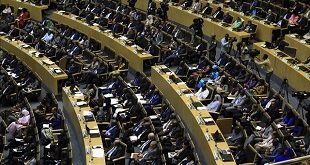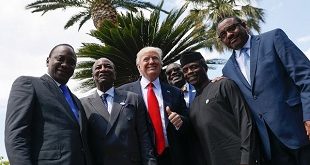
By Roland Atinkson
On 30 November, Joseph Kony failed ” once again ” to sign the Final Peace Agreement negotiated in Juba between the LRA/M rebels and the Government of Uganda (GoU). The absence of Kony’s signature (and, thus, that of President Museveni), worries many in Acholi, and has contributed to their still sluggish pace of returning home to their customary land.
The military raid last week by a combined Ugandan, Congolese and South Sudan force on the rebel camps in Garamba can only increase their apprehension.
Even so, a transition on the ground in Acholi from war to peace is underway, and will ” everyone must hope ” continue and even accelerate over 2009. The relative peace in Acholi since the silencing of the guns in late 2005 may be still fragile, but it is real and palpable, as anyone who went to Acholi anytime before late 2005, and has been back recently, can attest. And without meaning to be trite, I would emphasize that peace ” even if still not yet secure ” is better than war.
To be successful, the transition now underway will require ” most basically ” building a sustainable peace and reconstructing a northern Uganda ravaged by two decades of war. Doing so presents a daunting array of challenges, including a successful, secure return and resettlement of people who choose to go back to land that is theirs by both customary right and Uganda land law. This brief article focuses on one aspect of that return: the debate over the future of Acholi land, one typically framed as whether or not abundant, available (sometimes characterized as ’empty’) land is available in Acholi that should be opened up for ‘development,’ and the degree to which Acholi land is under threat from such interests.
For most long-displaced Acholi, the only productive asset they ‘own’ is the communal land to which they have rights, and regaining secure access to that land will be crucial for sustainable peace, reintegration, and recovery in the sub-region. But concerns about land are a dominant feature of life in Acholi today, including the basic issue of land access (especially for the most vulnerable segments of society such as widows and orphans).
Central to these concerns has been highly public pressure from central government for the opening up of Acholi land for ‘development,’ especially pressure since early 2007 to allocate land in Amuru district to the Madhvani group for a large-scale sugar cane plantation.
This has been opposed by most Acholi parliamentarians, local government officials, and others in the sub-region who have argued ” reasonably and persuasively ” that people need to be back on their land before any such alienation occurs.
The latest episode in this saga can be followed in the Daily Monitor beginning on November 13, 2008, when it ran a story indicating that, despite overwhelming local opposition: ‘The Cabinet has ordered that some 20,000 hectares of Acholi land be given to Kakira Sugar Works Ltd for sugar growing as a matter of urgency. . . . Daily Monitor has obtained a Cabinet memo . . . which . . . approved the allocation of the land in question [in a February 26, 2008 letter] with a proposal for government to acquire a 40 per cent stake in the deal.’ The letter ends with the most devastating element of all in the proposed deal: ‘The local population will be allocated land by the relevant authorities to become out-growers for your factory.’
Then on November 26, Daily Monitor reported that Nwoya MP Simon Oyet and Amuru residents had successfully secured a court order stopping any transactions on Amuru land, despite an Amuru District Land Board resolution the week before to give the land in question to Madhvani.
Then, with the last word (at least as this was being written), on December 2 the paper stated that in Parliament the day before, Lands Minister Omara Atubo denied land grabbing in Acholi, while announcing government backing for allocating the 20,000 hectares to Madhvani.
This central government support for alienating land for commercial sugar cane farming has been accompanied by powerful individuals gaining, or attempting to gain, private title to land that overwhelmingly belongs to communal land-holding groups. One example can be seen in a short Monitor article (March 19, 2008) entitled ‘Govt gives Amuru farmers Shs 1b’. At first glance, this seems positive. Government has made numerous commitments to reconstructing and developing war-affected areas of northern Uganda; the headline suggests action related to that commitment. But the story beneath the headline (and the story behind the story) indicates something quite different.
The billion shillings were going to a group called the ‘Amuru District Commerical Farmers Association.’ It is made up of 20-21 individuals with large private land holdings, up to 20,000 hectares or more, some ” if not mostly ” on customary communal land. Members comprise high ranking army officers and government officials, including parliamentarians from both the ruling party and opposition. Each member is required to clear 2 hectares of land for each of 20 Amuru displaced households, which would initially have free access to this land, but in subsequent years would be required to pay ‘interest.’ This on land to which at least many of these households have traditional communal rights, and which they will now have to pay private land holders to occupy and farm
And the Land Board appointed to oversee Amuru land issues has gotten in on the act as well (Monitor, 3 September): ‘At least 10,000 people face eviction after Amuru District Land Board officials applied for personal acquisition of an estimated 85,000 hectares of land.’
The extent to which all of this seems threatening and ill-considered is reflected in a report on land policy in post-conflict northern Uganda that the World Bank ” hardly an opponent in general of commercial farming or private land ownership ” is about to issue. The report’s first two, of three, main recommendations ” the 3rd encourages greater central government investment in the north ” are: (1) ‘Cultivating a desired level of trust in the people over land issues through administrative and other procedures that demonstrate explicit government commitment of protecting land and natural resource rights of IDPs on return;’ and (2) ‘Government needs to put an immediate moratorium or suspend the issue of land titles to investors or any other persons who wish at this particular time to acquire legal interests in land in Acholi and Lango regions until IDP return is completed and sensitization on land rights in both areas has taken place.’Sadly, this is not what has been happening thus far.
 The Independent Uganda: You get the Truth we Pay the Price
The Independent Uganda: You get the Truth we Pay the Price


